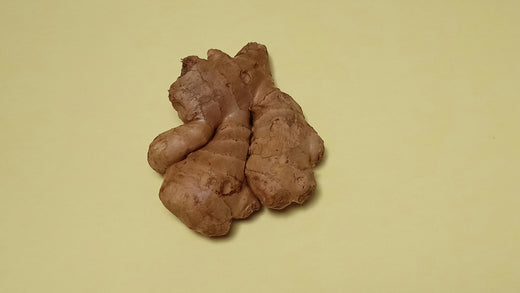Honey is a natural substance produced by bees from nectar or honeydew, which they process and store in wax cells. Through enzymatic action and evaporation, bees reduce the nectar’s water content, creating a stable, long-lasting product with a shelf life due to its low moisture content.
Ginger (Zingiber officinale) is a flowering plant native to Southeast Asia, known for its aromatic rhizome, used as both a spice and in traditional medicine. While its health benefits are debated, it remains a staple in cooking and wellness, with India leading global production.
Benefits of Honey & Ginger Together:
Have a look at the various ginger honey benefits and see how you can benefit from them:
- Honey helps thin mucus that blocks airways, while ginger reduces inflammation. Together, they form an effective natural remedy for cough and cold symptoms.
- Honey, ginger, and lemon are powerful ingredients that support immunity and help fight illness. Drinking honey-ginger-lemon tea or taking a daily spoon of the mix boosts your body’s defenses, thanks to their antioxidant properties.
- Ginger and honey, packed with antioxidants, enhance digestion by stimulating bile production and supporting healthy gut bacteria, which aids in fat breakdown and accelerates the digestive process.
- The ginger and honey combination can help alleviate chemotherapy side effects, such as nausea and vomiting. Additionally, their antioxidant-rich properties may help slow the growth of cancer cells.
- Ginger’s compounds help stimulate blood circulation, warm the body, and lower blood pressure. They also relax blood vessels, reducing the risk of heart disease.
Ginger and Honey: Natural Enhancers for Sexual Wellness:
The combination of ginger and honey is known to naturally enhance sexual health. Ginger helps improve blood flow and reduce inflammation, while honey boosts energy and vitality. Together, they can stimulate libido, support sexual performance, and help balance hormones, which may improve fertility in both men and women.
Natural Solutions for Pseudomonas Aeruginosa Infections: The Role of Honey and Ginger
Pseudomonas aeruginosa is a highly opportunistic and antibiotic-resistant pathogen that can cause severe infections, particularly in immunocompromised patients. Known for its ability to form protective biofilms and produce virulence factors, it is a major concern in healthcare settings, making it difficult to treat with conventional antibiotics.
This study explores the potential of combining honey and ginger as a novel approach to combat Pseudomonas aeruginosa infections, particularly antibiotic-resistant strains. Here are the key points regarding how ginger and honey may help cure infections:
- Antibacterial Properties: Both honey and ginger show antibacterial effects against P. aeruginosa, including resistant strains. Honey contains compounds like hydrogen peroxide and flavonoids that disrupt bacterial metabolism, inhibit quorum sensing (QS), and block biofilm formation. Ginger’s compounds, zingerone and gingerol, also inhibit QS and biofilm formation.
- Quorum Sensing (QS) Disruption: Honey and ginger interfere with P. aeruginosa’s QS systems, which control virulence and biofilm formation. Disrupting QS makes the bacteria more vulnerable to immune responses and antibiotics, without fostering resistance.
- Biofilm Inhibition: Both honey and ginger help prevent biofilm formation, making P. aeruginosa more susceptible to treatment.
- Synergistic Effects: Combining honey and ginger enhances their antibacterial efficacy, offering improved management of chronic, resistant P. aeruginosa infections compared to using either alone.
Effects of Honey and Ginger:
While ginger and honey have many benefits, they can cause side effects in some people. Allergic reactions, though rare, may include sneezing, itching, or rashes. Ginger can also cause heartburn in some individuals and may increase the risk of bleeding, especially if you’re taking blood thinners. Additionally, large amounts of ginger may cause gastrointestinal discomfort, such as diarrhea or throat irritation. Always consult a healthcare provider before adding new teas or supplements to your routine.
Did You Know How Ginger and Honey Can Transform Your Cooking, Tea, and Coffee?
Ginger and honey aren’t just healthy—they’re also flavor boosters! Here’s how you can use them in your kitchen:
In Cooking:
- Savory Dishes: Add ginger to marinades for meats or stir-fries, and drizzle honey over roasted veggies or chicken for a sweet balance.
- Baking: Use ground ginger and honey in cookies, cakes, or breads for natural sweetness and warmth.
- Sauces & Dressings: Mix ginger and honey into glazes or salad dressings for a flavorful, zesty kick.
In Tea and Coffee:
- Ginger-Honey Tea: Steep ginger slices in hot water and add honey for a soothing, immune-boosting drink.
- Ginger-Honey Coffee: Stir a spoonful of honey and a pinch of ginger into your coffee for a warming, energizing twist.
- Iced Drinks: Make ginger-honey syrup and add it to iced tea or lemonade for a refreshing, healthful flavour.
Creative Ways to Enjoy Ginger and Honey:
Incorporating ginger and honey into your daily routine is easy and delicious! Here are some fun recipe ideas:
- Ginger-Honey Smoothie: Blend ginger, honey, lemon, and tropical fruits like pineapple or mango for a refreshing, nutrient-packed drink.
- Ginger-Honey Overnight Oats: A wholesome breakfast combining honey, ginger, and oats to kickstart your day with flavor and energy.
Summary:
Ginger and honey are a powerful, natural combination with a wide range of health benefits, from boosting immunity and digestion to fighting infections. Whether enjoyed in your tea, added to your cooking, or blended into smoothies, these two ingredients offer versatile ways to enhance your wellness. Their rich history and proven effectiveness make them a timeless remedy, ready to be part of your everyday routine.

